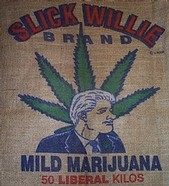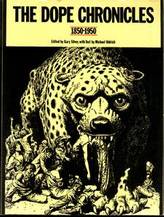|

ヘンプと政治
"Any way you slice it, there is no denying that this politically declared war has been just about as effective as the war on poverty, the war on crime and the war on cancer put together, which is to say, a complete defeat for William Bennett and his warriors." -William R. Hearst III, 1990.
It has been ten years since Hearst's editorial (printed in full below) called for an end to the drug war. Ten years and hundreds of billions of dollars later, and with tens of millions of American citizens arrested for drug offenses, the war is more of a failure than ever. It is ironic that one of the key players in the early 1900's in whipping up public opinion about this new drug marijuana was none other than William Randolph Hearst, grandfather of the above Hearst. The elder Hearst hated the Mexicans for nationalizing his timber holdings in Mexico, and popularized the idea of the violent producing drug from south of the border. He had large timber holdings in the West and knew of the potential of hemp in the paper industry.
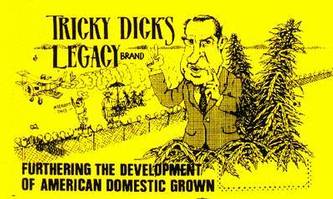 |
Pot label for a 1980's brand of marijuana (More Labels throughout the Hemp Museum)
|
The War on Drugs heated up in 1972 when Nixon rejected the report of the National Commission on Marijuana and Drug Abuse (below) to de-criminalize marijuana possession for personal use in private. Stepped up control of the borders was one of the recommendations he did follow.
 |
MARIJUANA: A Signal of Misunderstanding. 1972. The National Commission on Marihuana and Drug Abuse. The New American Library, Inc., New York, NY. 233 pages. Book size 7 X 4 inches.
Also called the Shafer Commission report after its chairman. "The most comprehensive study of marijuana ever made in the United States. A landmark report that cannot be ignored." Of course it was ignored. The Commission called for the removal of marijuana from the U.N. Single Convention on Narcotic Drugs, 1961, because it was mislabeled and not a narcotic at all.
|
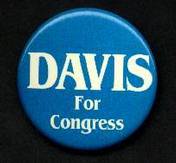 |
 |
|
The Curator ran for U.S. Congress in 1986 as an admitted pot grower, from the first Congressional district of California. He lost to the incumbent in a Democratic primary. A year before, 1985, local activists started the Mendocino County Greens.
|
When it comes to medical marijuana, Governor Davis has been a real disappointment. Where are you, Dennis?
|
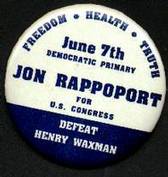 |
 |
|
A local political candidate who understood the meaning of hemp prohibition, but unfortunately lost the election bid.
|
The Libertarian Party is consistently behind the movement toward freedom to use drugs responsibly.
|
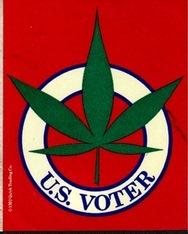 |
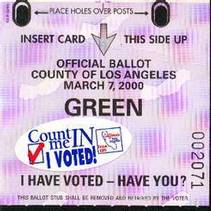 |
|
It is the educated voter that will make a difference in the struggle to re-legalize the plant. Proposition 215, California. Proposition 200, Arizona. Prop. G, Mendocino County.
|
It is time for each one of us to take voting much more seriously. Bush v. Gore was close, but only because 50% of voters did not bother to vote.
|
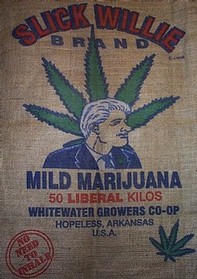
President Clinton gave us eight more years of a hopeless drug war. But then he had his own agenda to take care of, his own drugs to take (cigars & alcohol). I think his toll was something like 4 million arrests for pot in his eight years, and $17 billion a year for eight years equals $136 billion. The average politician is just as guilty for not ending this mess.
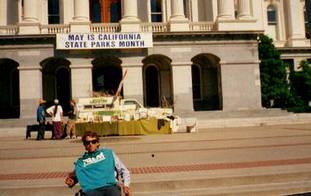 |
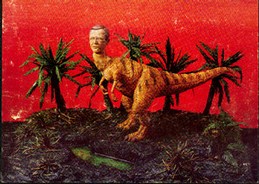 |
|
The U.S.A. Hemp Museum truck with lots of Hemp on the steps of the Capitol of California in Sacramento, where we logged 20 eight hour days in the early 1990's.
|
Governor Pete Wilson never came out to see the Hemp Museum, although he did sent his Chief of Staff to take a look.
|
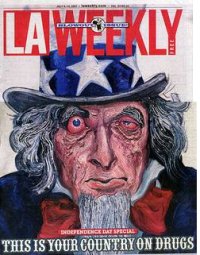
LA WEEKLY. Vol.23 No.33. July 6-12, 2001. Blowout Issue.
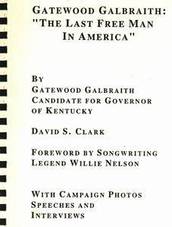
Kentucky lost a great opportunity by not electing Gatewood Galbraith for Governor. Instead, the Canadians are growing hemp and have been since 1995 experiments. The whole world will be making hemp products and selling them to us, as is happening, before we wake up and do something like obey the law that says the people control agricultural production. See U.S. v. Butler.
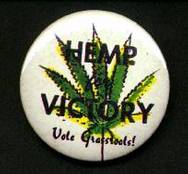 |
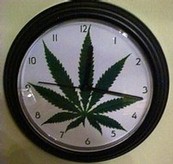 |
|
VOTE GRASSROOTS!
|
At the U.S.A. Hemp Museum it is always time for hemp.
|
|


 館長から皆さまへ
館長から皆さまへ ヘンプの歴史
ヘンプの歴史 ヘンプと農業
ヘンプと農業 ヘンプの医療と健康
ヘンプの医療と健康 ヘンプ食品
ヘンプ食品 ヘンプ織物
ヘンプ織物 ヘンプ縄と糸
ヘンプ縄と糸 ヘンプパルプ紙
ヘンプパルプ紙 ヘンプ建材
ヘンプ建材 ヘンプ燃料
ヘンプ燃料 ヘンプ原料
ヘンプ原料 ヘンプ溶剤
ヘンプ溶剤 ヘンプ・プラスチック
ヘンプ・プラスチック ヘンプと環境
ヘンプと環境 ヘンプと娯楽と精神世界
ヘンプと娯楽と精神世界 ヘンプと法律
ヘンプと法律
 ヘンプと政治
ヘンプと政治 ヘンプと政治
ヘンプと政治 提言 ドラッグ戦争を終結せよ
提言 ドラッグ戦争を終結せよ 社説 合法化しかない
社説 合法化しかない 政治関連図書
政治関連図書 ヘンプ貢献者
ヘンプ貢献者 ミュージアム図書館
ミュージアム図書館 Topに戻る
Topに戻る
